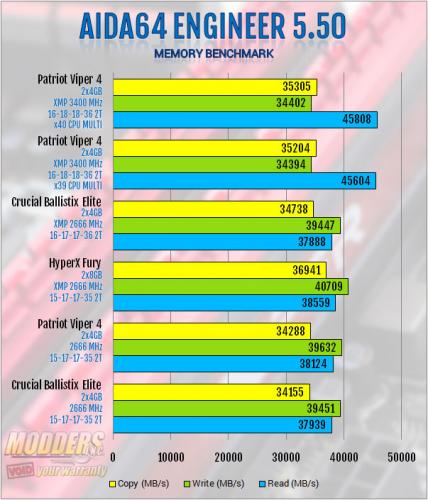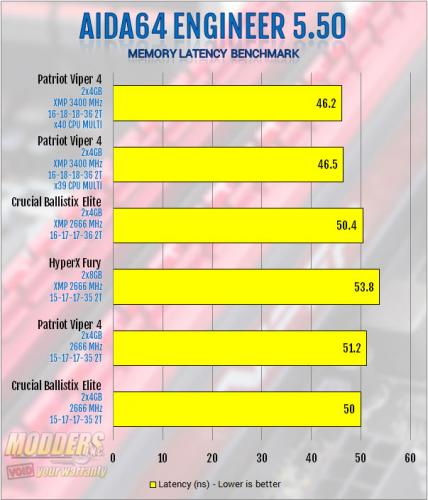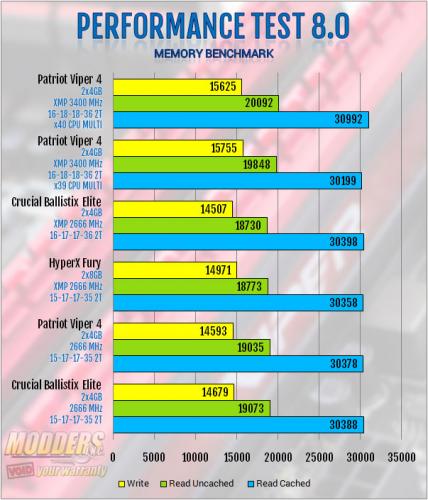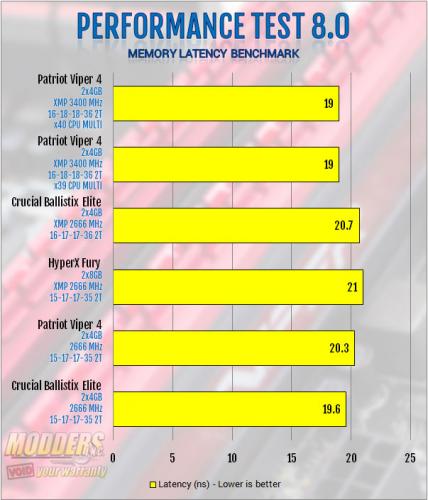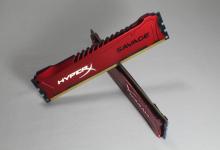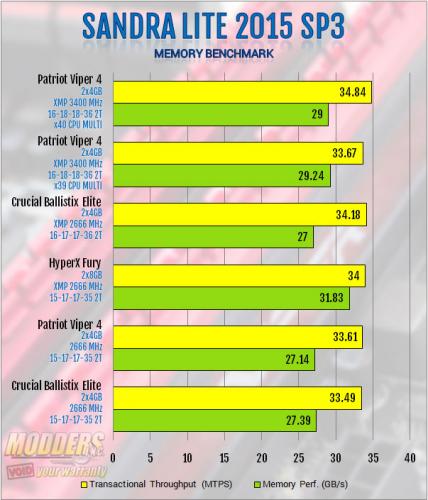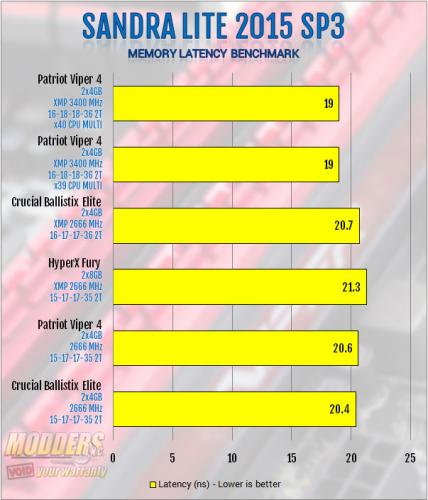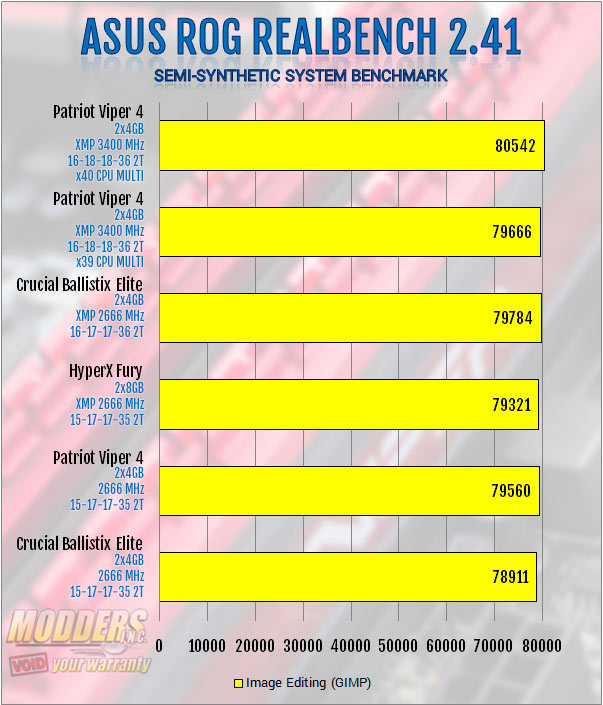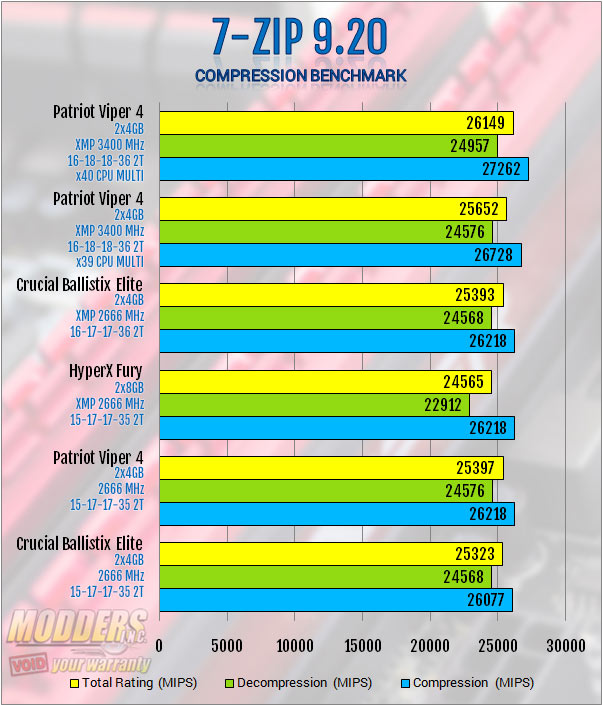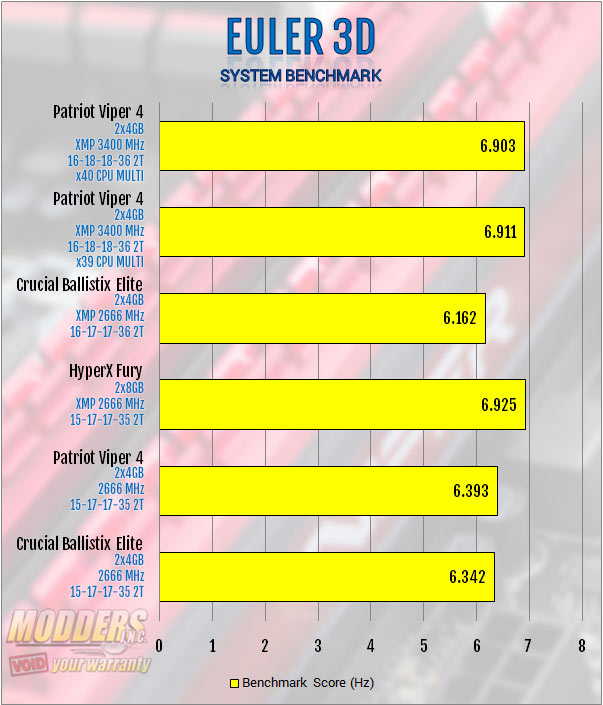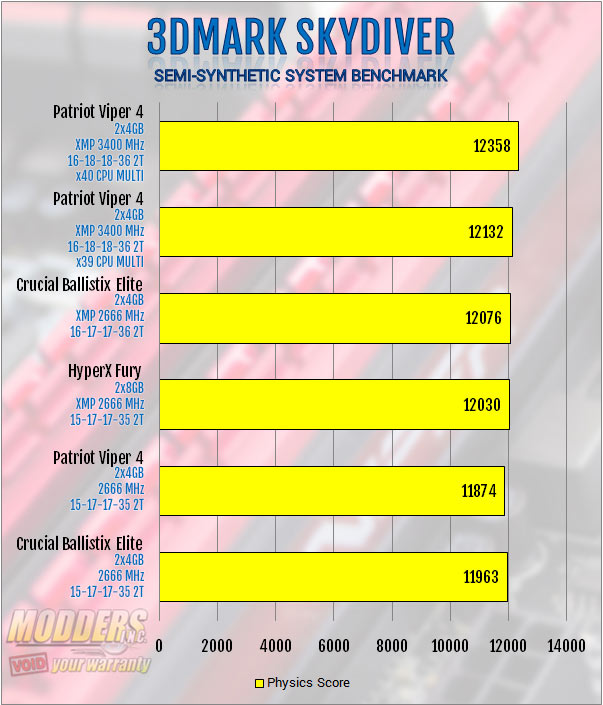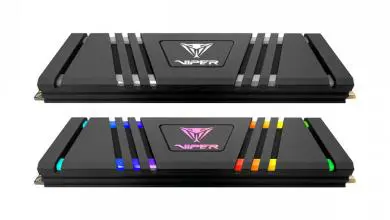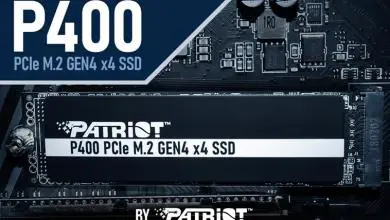Patriot Viper 4 3400MHz CL16 PV48G340C6K 2x4GB DDR4 Review: Fast is the New Normal
Test Setup and Benchmarks
| Component | Name | Provided by: |
| CPU | Intel Core i7-6700K (ES) | Intel |
| Motherboard | Gigabyte Z170X-UD5 (F4b beta BIOS) | Gigabyte |
| CPU Cooler | Noctua NH-D15 with Noctua NT-H1 Thermal Compound | Noctua |
| Graphics | Gigabyte GTX 960 Windforce 3X OC | Gigabyte |
| Storage | Silicon Power S80 SSD | Silicon Power |
| Case | DimasTech Mini V1 | DimasTech |
| Power Supply | Corsair HX850 | Corsair |
| Operating System | Windows 10 LTSB Enterprise |
DDR4 Memory Module Kits (Default):
| Manufacturer | Name | Memory IC | Capacity (per module) | Clock Speed (XMP) | Timings (XMP) | Notes |
| HyperX (Kingston) | Fury | Dual-rank SK Hynix | 8GB | 2666 | 15-17-17-35 2T 1.2V | Dual-Channel kit |
| Patriot | Viper 4 | Single-rank Samsung | 4GB | 3400 | 16-17-17-36 2T 1.2V | Dual-Channel kit |
| Crucial | Ballistix Elite | Single-rank Micron | 4GB | 2666 | 16-18-18-36 2T 1.35V | Pair taken from a 4-piece kit |
- All modules were set to their default XMP profile values
- Since there is no direct divider for 3400MHz DDR4, the Patriot Viper 4 sets the divider to 33.33 and walks the BCLK to 102. This overclocks the CPU so to show a balanced benchmark result, the CPU multiplier was set to both 40 (default, 4080MHz) and 39 (3978MHz) for the Patriot Viper 4 3400MHz benchmark.
- For the parity part of the comparison, all modules were set to the same clock speed (2666MHz) and timings (15-17-17-35), including tRFC (set to 347), Command Rate (2T), and tRC (60) for parity.
- CPU multiplier clock locked at 40, BCLK locked at 100 and cache frequency locked at 4GHz.
- Turbo Boost disabled
- Latest working BIOS, updates and drivers were used at the time of the review. Each test was conducted at least three times for accuracy.
Benchmark Programs:
- AIDA64 Engineer Edition 5.50.3600
- Passmark Performance Test 8.0 (build 1051)
- SiSoft Sandra Lite 2015 SP3 (21.47)
- RoG RealBench 2.41
- 7-Zip 9.20
- STARS Euler3D CFD
Benchmarks
AIDA64 is a very versatile program that we use here at Modders-Inc for our CPU cooler, storage as well as CPU reviews but it also has a built-in synthetic memory benchmark that measures the Copy, Read, and Write speeds of the DRAM installed in Megabytes-per-second (higher is better). It also measures total latency in nano-second (lower is better).
Like AIDA64, Passmark’s Performance Test 8.0 suit is also a very versatile program with a different set of benchmarks per component and has a suite of memory tests of its own. The read, read uncached and write speeds are used (measured in synthetic scores, higher is better) as well as the built-in memory latency test in nano-seconds (lower is better).
Sandra LITE is a free version of SiSoft’s Sandra testing suite. Similar to AIDA64 and PassMark Performance Test, Sandra Lite is a synthetic benchmark program that has its own set of system memory specific benchmarks. Aggregated scores of the Memory bandwidth performance in Gigabyte-per-second and Memory Transactional Throughput in total throughput-per-second are measured (higher is better). Memory latency is also measured in nano-second (lower is better).
ASUS Republic of Gamers’ RealBench is a semi-synthetic testing suite that collects four different programs and can perform controlled runs of each related to image editing (GIMP), video encoding (Handbrake H.264), OpenCL (Luxmark) and Heavy Multitasking (Combination of all three at the same time). Only the image editing part is used as GIMP uses up to SSE4.2 CPU extensions and focuses on single threaded CPU and memory performance that is frequency and timing sensitive. The controlled aspect of this otherwise “real-world” test makes it semi-synthetic.
For compression, 7-zip is used which is an open source (GNU) compression program utilizing LZMA method as the default. This is a real-world program with a built-in benchmark measuring compression, decompression and total speed in million instruction per second (MIPS).
Euler 3D is a fluid dynamic simulator that is based on an aeroelastic test wing. The wing has been tested at the NASA Langley research center as is the standard test used for validation of compressible coputational fluid dynamic codes. Euler 3D is extremely sensitive to memory timings and CPU performance.
Futuremark’s 3DMark is a semi-synthetic gaming benchmark that calculates both graphics and CPU-bound physics in a controlled series of tests and provides scores that can be compared with other gaming platforms. The physics benchmark of the Skydiver suite for mainstream gaming PCs is used.
